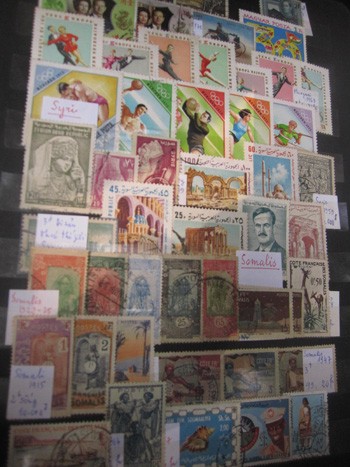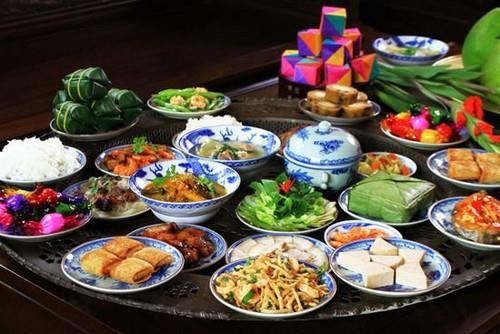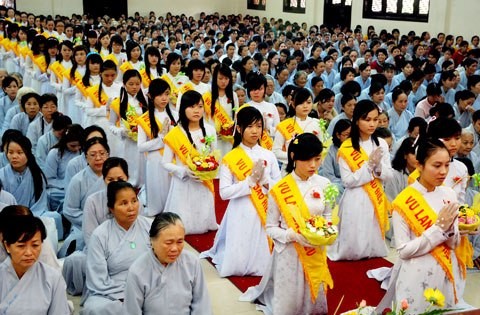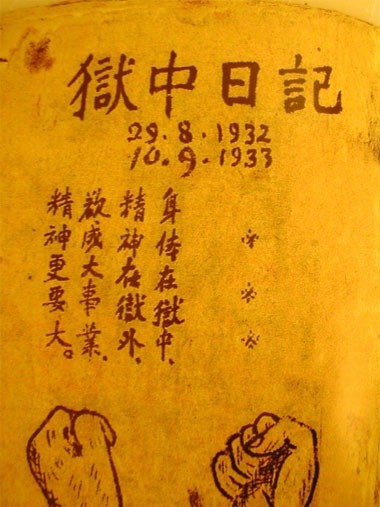A: First on our show today, we’d like to welcome Mrityunjoy Bera of India to VOV. Last week, Mr. Bera sent us several reception reports on our broadcast. He wrote: “I listened to your program online, news of the Vietnamese economy and world news and later my favorite, Letter box. I am also fond of your other programs. Your website attracts me very much. It helps me learn about the Vietnamese economy, culture and society.”
 Stamp market in Trieu Viet Vuong street, Hanoi meets every Sunday Stamp market in Trieu Viet Vuong street, Hanoi meets every Sunday |
B: Thank you, Mr. Bera, for listening to our broadcast. We’ll verify your reports with QSL cards. Commenting on our story about a stamp market in Hanoi, Najim Uddin of India wrote: “The stamp market in Hanoi opens every Sunday morning in Trieu Viet Vuong street. Stamp lovers come there to browse and trade stamps. It’s very interesting to me because I’m a stamp collector, too. Another useful bit of information was in your story about the largest and oldest university in Vietnam. I learned that possibly the finest architectural complex in Hanoi is Van Mieu, the Temple of Literature which was built in 1070 during the Ly dynasty. Founded in honor the Confucius, it served as a center for learning and educating future mandarins for more than seven centuries.”
A: Najim Uddin mentioned the festival which falls on the 15th day of the 7th lunar month and asked about other festivals in Vietnam.
B: Vietnam has a lot of festivals throughout the year thanks to the cultural diversity of its 54 ethnic groups. Next week, for example, Vietnam will celebrate Wandering Souls' Day which falls on the full moon of the 7th lunar month.
 Vietnam celebrates Wandering Souls Day on the 15th of the 7th lunar month Vietnam celebrates Wandering Souls Day on the 15th of the 7th lunar month |
A: It’s celebrated by most Vietnamese. When a person dies it is believed their soul goes to hell where it is judged and, depending on the person's behavior on earth, is sent to heaven or kept in hell. Souls in hell can gain release through the prayers of the living. Wandering Souls' Day is the best time for these rituals. Hell's gates are opened at sunset and hungry souls fly out, returning to their family altars for shelter.
A: Families place meals for their ancestors on their altar and place a tray of food outdoors for 'wandering souls', who have no relatives, or whose relatives have forgotten them. Incense sticks and votive papers – money, clothes, and other items– are burned. After taking the offering, lost souls will move on, neither entering the house nor hanging around to disturb the owner. Wandering Souls' Day is a solemn occasion and there is no entertainment. Some people also go to a pagoda to pray for the salvation of the souls.
 Vietnamese people dedicate the full moon day of the 7th lunar month to expressing filial piety to their parents. Vietnamese people dedicate the full moon day of the 7th lunar month to expressing filial piety to their parents. |
B: Vietnamese people dedicate the full moon day of the 7th lunar month to expressing filial piety to their parents. The festival is closely connected to the Asian tradition of ancestor worship and filial piety.
A: Each year Vietnamese people honor their parents and welcome the souls of their ancestors back to earth on the full moon day of the 7th lunar month. This year it will fall on Saturday, August 25th.
B: The legend behind the festival dates back to the earliest days of Buddhism. Muc Kieu Lien was one of the Buddha's devoted disciples. One day while he was meditating, he saw his late mother being tortured in hell for the sins she had committed during her life. He saw that his mother was starving and had nothing to eat. Muc Kieu Lien summoned all his spiritual powers to bring her a bowl of rice, but the food burned to ashes in front of her.
A: Muc Kieu Lien returned to the living world and asked the Buddha to help him to fulfill his duty as a pious son. The Buddha advised him to gather monks and devotees and ask them to pray together on the 15th day of the 7th lunar month. Their combined prayers were so powerful that the god of hell released Muc Kieu Lien’s mother and many other souls. Ever since that day during the festival of Vu Lan - Wandering Soul’s Day- the gate of hell is believed to open to give tormented souls a 24-hour holiday.
B: Many other Buddhist countries share the Vietnamese custom of offering food, clothing, and other items to hungry spirits. The object of this annual custom is to feed the hungry ghosts and pray for their salvation and for living people to express their gratitude and appreciation to their living mothers. Traditionally Buddhist followers visit pagodas wearing red roses if their parents are alive and white roses if their parents have passed away. The rose is a symbol of love and sharing between parents and children regardless of social background. The festival is no longer exclusively for Buddhists. It has become an occasion for everyone to express their love for their parents.
A: Hafizur Tahaman of India emailed us on August 8. He wrote: “Letter Box is your weekly feature dedicated to listeners around the world. We really enjoy Letter Box because it is very interesting. Thanks a lot for your detailed report about the garment and textile industry in Vietnam in the August 1st Letter Box. I’m a new listener to your broadcast. Here the reception quality is not so good. Please try to improve the reception quality.”
B: Thank you for your report on the content and technical quality of the program, Hafizur Tahaman. We’ll talk to our technicians about the reception quality. We’ll send you a QSL card to confirm your report.
A: Michael Cunningham who listened to our broadcast on August 7 from 10:00 to 10:30 on the frequency of 9840 khz told us that he recently purchased a book entitled “the Prison Diary of Ho Chi Minh”. Michael wrote: “I’m very happy to have received it. The poems are very evocative and the book maybe should have a program dedicated to its story.”
|

Prison Diary of President Ho Chi Minh is one of Vietnam's national treasures
|
B: In his revolutionary career, Ho Chi Minh wrote many historic works, including a collection of poems called “Prison diary”. It is a self-portrait in verse, reflecting the humane and optimistic soul of the profound communist and poet Ho Chi Minh. “Prison diary” consists of 133 poems written from 1942 to 1943. The original edition is a small notebook whose cover is illustrated with 4 verses and a sketch of two hands in chains. Ho Chi Minh was both the author of and a character in, these jail stories written in a diary format.
A: “Prison diary” is an autobiography in verse, in which the revolution and the people hold the supreme position. The poems depict the revolutionary’s perseverance, resilience and iron will to overcome all hardships with hope and optimism for the future. While enduring 18 months in prison in China’s Quangxi province, the author showed dignity and was unruffled as a revolutionary prisoner.
B: “Prison dairy” has been translated into English, Arabic, Portuguese, German, Korean, Japanese, and Spanish. In 2012, the Prime Minister of Vietnam signed a decision recognizing “Prison diary” as a national treasure.
A: Thank you all for tuning in to VOV. We welcome your feedback at: English Service, VOVWORLD, the Voice of Vietnam, 45 Ba Trieu Street, Hanoi, Vietnam. Or you can email us at: englishsection@vov.org.vn. You’re invited to visit us online at vovworld.vn, where you can hear both live and recorded programs. Check out our VOV Media App available on both the IOS and Android platform to hear our live broadcasts. We look forward to your feedback on the mobile version of vovworld.vn. Once again, thank you all for listening. Good bye until next time.